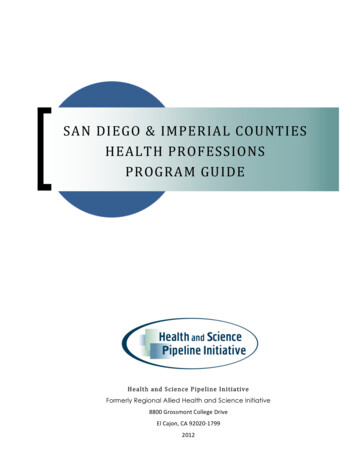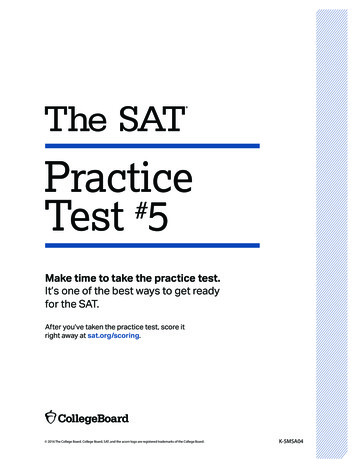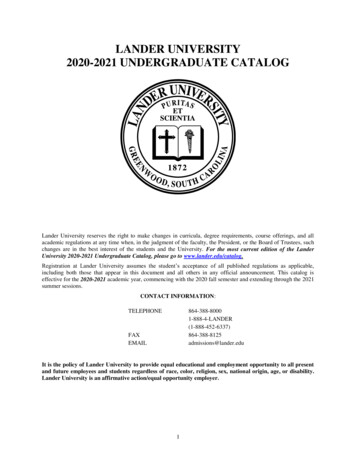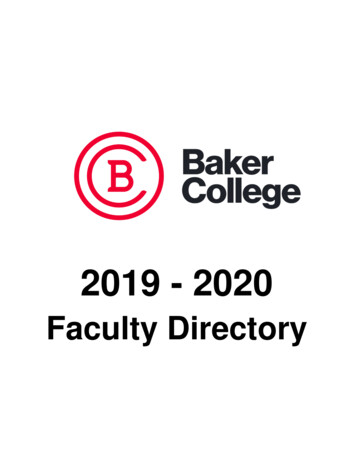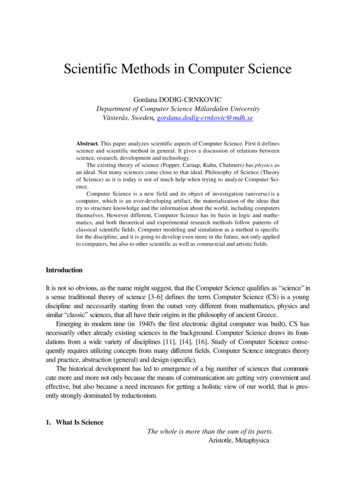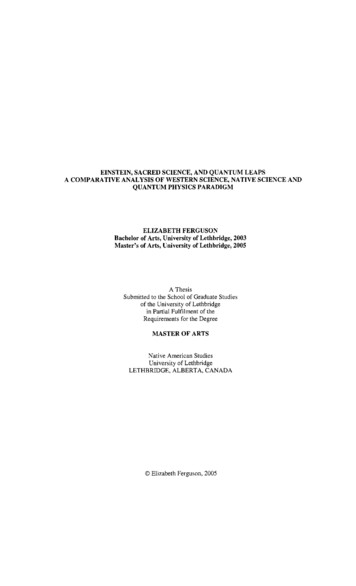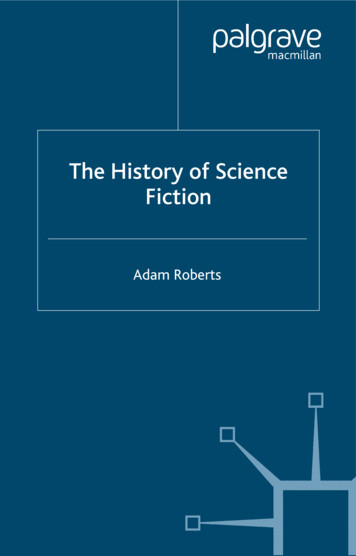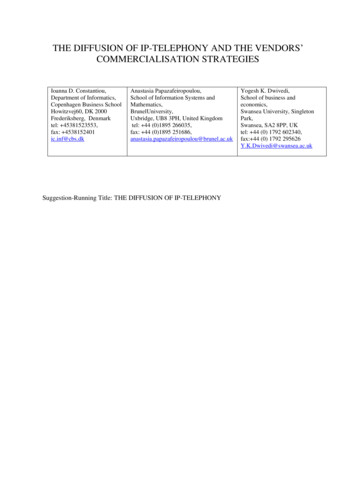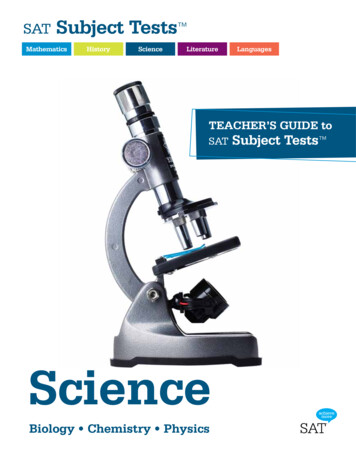
Transcription
SATSubject Tests R’S GUIDE toSATScienceBiology Chemistry PhysicsSubject Tests
ScienceDear Educator,We know connecting your students to college opportunity and success is important to you.One way to help your students along the path to higher education is to share with them thebenefits of taking SAT Subject Tests .The SAT Subject Tests are hour-long tests based on high school course work offered acrossfive subject areas: Science, Mathematics, English, History and Languages.Coupled with students’ high school grades and SAT scores, Subject Test scores can create apowerful and comprehensive picture of your students’ capabilities, helping them stand outto prospective colleges. Colleges also use SAT Subject Tests to put other admission factorsinto context, place students in certain courses and even offer credit based on SubjectTest performance.To better support you in helping your students do well on these tests, we are pleased toprovide you with the Teacher’s Guide to SAT Subject Tests in Science, a comprehensiveresource that will familiarize you with the science tests and the topics they cover. Itincludes sample questions as well as tips and best practices from other teachers to help youadvise and prepare your students to do their best on the SAT Subject Tests.The best news for science teachers? SAT Subject Tests cover the material you already teachyour students. In fact, 82 percent of high school science teachers agree that the knowledgeand skills measured by the SAT Subject Tests in Science are part of their existingcurriculum. Nearly 90 percent of high school teachers and college professors surveyedindicated that the knowledge and skills tested on the SAT Subject Tests are important forcollege readiness.There is no better source than you — teachers in the classroom — when it comes to helpingstudents prepare for the SAT Subject Tests. If you have feedback, tips or ideas you’d like toshare with other teachers, please send them to us at SATSubjectTests@collegeboard.org sowe can include them in future guides.The SAT Subject Tests in Science will help your students shine in the college admissionprocess. We appreciate the opportunity to partner with you to help your students showcasethe knowledge and skills you have taught them.The College Board
TABLE OF CONTENTSIntroductionSAT Subject Tests. . . . . . . . . . . . . . . . . . . . . . . . . . . . . . . . . . . . . . . . . . . . . . . . . . . . . . . . . . . . . . . . 2Overview of the Biology Subject Test. . . . . . . . . . . . . . . . . . . . . . . . . . . . . . . . . . . . . . . . . . . . . . . . . . 9Overview of the Chemistry Subject Test. . . . . . . . . . . . . . . . . . . . . . . . . . . . . . . . . . . . . . . . . . . . . . . 12Overview of the Physics Subject Test. . . . . . . . . . . . . . . . . . . . . . . . . . . . . . . . . . . . . . . . . . . . . . . . . . 15Biology Subject TestSample Questions and Answer Explanations. . . . . . . . . . . . . . . . . . . . . . . . . . . . . . . . . . . . . . . . . . . . 19Chemistry Subject TestSample Questions and Answer Explanations. . . . . . . . . . . . . . . . . . . . . . . . . . . . . . . . . . . . . . . . . . . . 39Physics Subject TestSample Questions and Answer Explanations. . . . . . . . . . . . . . . . . . . . . . . . . . . . . . . . . . . . . . . . . . . . 67Best PracticesFrom Teachers to Teachers. . . . . . . . . . . . . . . . . . . . . . . . . . . . . . . . . . . . . . . . . . . . . . . . . . . . . . . . . 93Answer SheetSample SAT Subject Test Answer Sheets. . . . . . . . . . . . . . . . . . . . . . . . . . . . . . . . . . . . . . . . . . . . . . . 98SATSubject Tests1
What Are the SAT Subject Tests ?SAT Subject Tests are one-hour-long exams that give students the opportunity to enhance their collegeadmission credentials by demonstrating their knowledge in specific subjects.They are the only national admission tests in which your students choose to take the tests that best showcase theirachievements and interests.Because every student is unique, academic records often don’t tell the whole story of his/her capabilities andpotential. Encourage your students to consider taking one or more SAT Subject Tests so theycan show colleges a more complete picture of their academic background, interests and talents.What Are the Benefits of Taking the SAT Subject Testsin Science?The SAT Subject Tests in Science can help students differentiate themselves in a competitive college admissionenvironment by providing additional information about their readiness for college-level study. This is importantfor all students as it contextualizes other academic credentials, such as grades, SAT scores, etc.Some schools require SAT Subject Tests in Science for admission into science and engineering programsor majors, while others require these tests from all students. For example, the California Institute of Technologyrequires all applicants to submit Subject Test scores in both mathematics and science. Many colleges useSubject Test scores to advise students or help with course placement. Other schools allow students to placeout of introductory courses or gain credit based on their performance on certain Subject Tests. Students canvisit bigfuture.collegeboard.org/college-search to explore colleges and get information about Subject Testrequirements.TipStudents can use SAT Subject Tests for purposes beyond college admissionand placement. For example, students in New York can use them as asubstitute for some Regents exams for a New York State Regents high schooldiploma. Subject Tests can also be used to fulfill subject-based competencyrequirements for large university systems like the University of Californiaand the University of Arizona.What Are the Differences Between the SAT and the SAT Subject Tests?The SAT is the most widely used college entrance exam, testing what students learn in classrooms and how wellthey apply that knowledge. Its reading, math and writing sections are based on the critical thinking and problemsolving skills needed for college success.SAT Subject Tests cover a wide range of subject areas, including science, history and languages. Each SAT SubjectTest focuses on a single subject and indicates a student’s readiness to take college-level courses in that subject.Tip2Encourage your science students who are applying to competitive collegesor programs of study to take an SAT Subject Test in Science to enhancetheir college applications.SATSubject Tests
Which Students Should Take SAT Subject Tests?Many students can benefit from taking SAT Subject Tests to highlight their knowledge of a specific subjector subjects. SAT Subject Tests may be especially beneficial for students who: Are applying to colleges that require or recommend Subject Tests for admission and/or specific majorsor areas of study. Want to show strength in specific subject areas. Would like to demonstrate knowledge obtained outside a traditional classroom environment(e.g., summer enrichment, distance learning, weekend study, etc.). May be able to place out of certain classes in college. Are enrolled in dual-enrollment programs. Are home-schooled or taking courses online.TipEncourage your science students who may not be as strong in otheracademic areas or who are English language learners (ELL) to take theSAT Subject Tests in Science to showcase their science knowledge. ELLstudents may benefit from taking an SAT Subject Test in Science becauseit is not as reliant on English language mastery.Should Students Taking Advanced Placement ClassesTake SAT Subject Tests?SAT Subject Tests are high school-level tests, reflecting high school curricula. AP Exams assess a student’scollege-level knowledge, skills and abilities learned in the corresponding AP courses in high school. Manycolleges still require students to submit SAT Subject Test scores, even if they have taken AP Exams. Studentstaking AP courses may benefit from taking SAT Subject Tests as an additional opportunity to show collegestheir knowledge of specific subjects. The tests also can gauge student readiness for AP Exams. As a result,some students take SAT Subject Tests as early as the spring of their freshman or sophomore years.SATSubject Tests3
When Should Students Take SAT Subject Tests?The best time for students to take the Subject Tests is after they complete the corresponding course or set ofcourses, when the content is still fresh in their minds. Students who wait until the fall of their senior year totake tests may miss the opportunity to put their best foot forward.Not every test is offered on every test date, so encourage your students to review the SAT Subject Testcalendar early so they can plan accordingly. The test calendar can be found on es.TipSuggest that your students take the SAT Subject Tests in Science soon afterthey have completed the corresponding course or set of courses to avoidscrambling during the fall of their senior year.How Do Colleges Use SAT Subject Test Scores?Colleges use SAT Subject Test scores to gain a more comprehensive understanding of a student’s academicbackground and achievement in specific areas. They use this information, along with factors like high schoolgrades, extracurricular activities and other test scores, to make admission or placement decisions.Some colleges require Subject Test scores for general admission or acceptance into certain majors or coursesof study.Other schools recommend Subject Test scores to help them make more informed admission decisions, andnearly all schools will take Subject Test scores into consideration as part of a student’s college application.Many colleges also use Subject Test scores for course placement and advising, and others will allow studentsto place out of introductory courses or receive credits based on performance on certain Subject Tests.Most college websites and catalogs include information about admission requirements, including whichSubject Tests are needed or recommended for admission. Advise your students to research Subject Testrequirements and recommendations for the schools they are interested in attending.“At Caltech, where the academic emphasis is on STEM fields, it is critical for us to require and evaluatecertain SAT Subject Tests in math and science to get a stronger sense of a student’s true passion andstrength in these areas. We select candidates from a talented pool of applicants, and SAT Subject Testshelp us to better understand a student’s preparation for our demanding curriculum.—Jarrid Whitney, Executive Director of Admissions and Financial AidCalifornia Institute of Technology4SATSubject Tests”
What SAT Subject Tests Are Offered?Twenty tests are offered in five subject areas: Science, Mathematics, English, History and Languages. Three ofthe tests are in Science: Biology E (Ecological focus) or M (Molecular focus), Chemistry and Physics.EnglishLiteratureLanguagesHistoryUnited States HistoryWorld HistoryReading OnlyLanguages withListeningFrenchChineseMathematicsMathematics Level 1Mathematics Level 2GermanFrenchItalianGermanLatinJapaneseModern HebrewKoreanSpanishSpanishScienceBiology E/MChemistryPhysicsWhich SAT Subject Tests Should Your Students Take?While advising your science students to take one or more of the SAT Subject Tests in Science, also considerencouraging them to take other SAT Subject Tests in areas in which they excel or have an interest. In addition,students should research to determine if the colleges they are considering require or recommend Subject Testsfor admission or other purposes.TipShare information about the SAT Subject Tests with other teachers at yourschool so they can recommend SAT Subject Tests to students who mightbenefit from taking these tests.How Do Students Register for the Tests?Students can register for the SAT Subject Tests several ways: On the College Board’s website at collegeboard.org. Most students choose to register for Subject Testson the College Board’s website. By telephone (for a fee) if the student has registered previously for the SAT or an SAT Subject Test. Tollfree, within the United States: 866-756-7346; from outside the United States: 212-713-7789. If students do not have access to the Internet, registration forms are available in The Paper RegistrationGuide for the SAT and SAT Subject Tests. Students can find the booklet in a guidance office at most highschools or by writing to:The College BoardSAT ProgramP.O. Box 025505Miami, FL 33102SATSubject Tests5
When students register for the SAT Subject Tests, they will need to indicate the specific Subject Tests theyplan to take on the test date they select. Students may take one, two or three tests on any given test date; theirtesting fee will vary accordingly. Except for the Language with Listening tests, students may change theirminds on the day of the test and instead select from any of the other Subject Tests offered that day.Is There a Fee-Waiver Service?Eligible students in grades 9–12 may receive fee waivers to take up to three SAT Subject Tests in each of twosittings (up to six tests total). These fee waivers are available in addition to those given for the SAT.How Can Students Prepare for the SAT Subject Tests?There are several ways students can prepare for the Subject Tests.Regular Course WorkThe best preparation for students is to learn the material taught in the classroom. The SAT Subject Tests arebased on high school curricula. Later in this guide we will discuss ways you can help your students preparethroughout the year while taking your course.Free Resources on collegeboard.orgCollegeboard.org offers a variety of information to help students prepare for the SAT Subject Tests. The sitediscusses topics covered on each test, recommended preparation and tips to help students do their best ontest day.Students can also prepare using the free sample practice materials offered by th
research studies, test and student experience enhancements and updates of student practice tools. SAT Subject Tests O ered SAT Subject Tests in nonlanguage subjects assess a student’s comprehension of fundamental concepts, their content knowledge and their ability to apply that knowledge to solve routine and nonroutine problems. SAT Subject Tests in languages assess a student’s .

